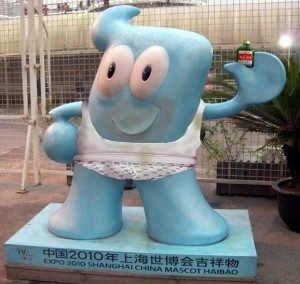By WEN LOCK
Olympics Correspondent
BEIJING (China Daily Show) – It’s 11 o’clock on a weekday morning in Beijing’s Central Business District – but for Jingjing the Panda, it’s simply time for the first drink of the day.
The once-loveable Olympics mascot – or Fuwa – is now a sad shadow of her plush 2008 glory days. The dyed black wool around her eyes has been faded by tear-stains and her snow-white cheeks are now stained a grim nicotine-yellow.
“I find it hard to get work,” she says, cradling a bamboo juice – her fourth of the day.
This downtown bar opens just before midday and Jingjing is normally the first customer through the door. “These days, the demand for a four-year-old Chinese cuddly Olympics mascot is surprisingly low,” she claims.
She blames her personal decline on a superstitious online slam campaign that linked Jingjing, a native of Sichuan, with the earthquake that devastated the region in 2008.
Nini, a prosaic green swallow who looks like a kite, was also tied to a deadly train crash in Shandong’s Weifang – known as ‘Kite City.’ Other Fuwa suffered similar accusations, but it was Jingjing who possibly took it the worst.

“I stopped going out – and started drinking,” recalls the bedraggled bear. “My libido, which was always pretty low, soon hit rock bottom. Then my teeth started falling out.”
Jingjing’s hit TV show, It’s Fuwa Time, was swiftly cancelled; her agent stopped answering calls soon after. “I couldn’t even get a job at the Beijing Zoo,” Jingjing admits with a bitter smile.
While tragic, Jingjing’s story is hardly an exceptional one.
All five Fuwa – the cuddly dolls based on China’s four most popular animals and the Olympic Flame, and whose names once spelt out ‘BeiJing Huan Ying Ni’ (‘Beijing Welcomes You’) – have since fallen on hard times.
Beibei the Fish is perhaps the most successful, having landed a steady job at a Hebei water park. “It pays the bills,” Beibei explained in a brief, terse phone interview.
The Fuwas’ sad decline highlights systemic problems with the country’s state-run sports system, which demands its athletes dedicate their lives to ‘patriotic glory’ – but often abandons them once they can no longer perform in a stadium.
Last year, for example, champion gymnast Zhang Shangwu, 29, was discovered begging on a Beijing street. In 2008, tennis star Li Na left the national side to pursue her own career, going on to win the French Open in 2010.
It proved a less-successful move, however, for Yingying, the Tibetan Antelope, who rapidly became a banned keyword after giving a controversial acceptance speech, expressing support for the Dalai Lama, at an elementary school prize-giving ceremony.
“I had a few too many fermented yak teas,” Yingying admitted later.
But the apology came too late for many – Yingying lost a lucrative consultancy gig at big-game consortium Safari Tibet Together and is currently believed to be either dead or living abroad in Dallas.

“I have it all: money, women and constant access to other people’s cigarettes,” former Olympic Flame fuwa Huanhuan boasted in 2009.
At the height of his fame, Huanhuan married Hello Kitty at a 50-million yuan ceremony in Sanya, Hainan. But the fairytale union quickly ran aground and the pair divorced acrimoniously just eight weeks later.
“I blew most of my cash on the wedding,” he admitted last year. “That little bitch Kitty took the rest.” Huanhuan committed suicide this February – leaving only a cryptic note referring to himself as a “candle in the Olympic wind.”
Now more than ever, times are difficult for the Fuwa.
As the rest of the sporting world applauds the triumphs of Chinese gold medallists like Ye Shiwen and Chen Ruolin, the memory of the Games and its London closing ceremony brings nothing but bitterness for the surviving Fuwa.
And it’s not only ex-Olympians feeling the pain – other state-sponsored mascots have seen their stocks plummet too.
Near a neglected Dalian dock, infamous for its bawdy nature, we find Haibo, the former 2010 symbol of the Shanghai Expo.
Once known for his chirpy charisma and bright blue skin, Haibo today ekes out a grim existence, offering hand-relief to North Korean sailors in exchange for just a few yuan.
“I can still trade off my fame a little,” Haibo admits after a few glasses of baijiu. “But it’s getting rougher out there. And I can’t get real money offering full sex, either – because I don’t have any proper genitals to speak of.”
Got a tip? Contact us at cds@chinadailyshow.net
Follow this and other leading China news at @chinadailyshow on Twitter
